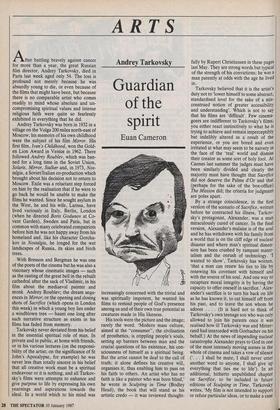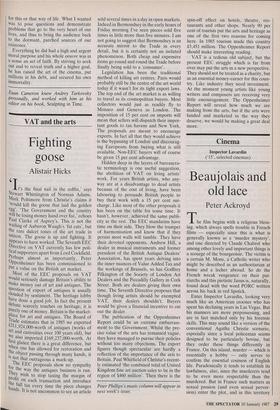ARTS
After battling bravely against cancer for more than a year, the great Russian film director, Andrey Tarkovsky, died in Paris last week aged only 54. The loss is profound not merely because he was absurdly young to die, or even because of the films that might have been, but because there is no comparable artist who comes readily to mind whose absolute and un- compromising spiritual values and intense religious faith were quite so fearlessly exhibited in everything that he did.
Andrey Tarkovsky was born in 1932 in a village on the Volga 200 miles north-east of Moscow; his memoirs of his own childhood were the subject of his film Mirror. His first film, Ivan's Childhood, won the Gold- en Lion Award in Venice in 1962. There followed Andrey Roublev, which was ban- ned for a long time in the Soviet Union, Solaris, Mirror, Stalker and, in 1973, Nos- talgia, a Soviet/Italian co-production which brought about his decision not to return to Moscow. Exile was a reluctant step forced on him by the realisation that if he were to go back he would be unable to make the films he wanted. Since he sought asylum in the West, he and his wife, Larissa, have lived variously in Italy, Berlin, London (when he directed Boris Godunov at Co- vent Garden), Sweden and Paris, but in common with many celebrated compatriots before him he was not happy away from his homeland and, like his character Gorcha- kov in Nostalgia, he longed for the wet landscapes of Russia, its skies and birch trees.
With Bresson and Bergman he was one of the poets of the cinema but he was also a visionary whose cinematic images — such as the casting of the great bell in the rebuilt cathedral after the sack of Vladimir, in his film about the mediaeval painter and monk Andrey Roublev; the dream sequ- ences in Mirror; or the opening and closing shots of Sacrifice (which opens in London this week) in which a young boy lies under a windblown tree — haunt one long after such narrative structure as exists in his films has faded from memory.
Tarkovsky never deviated from his belief in the essential spiritual role of man. In private and in public, at home with friends, or in his various lectures (on the responsi- bility of the artist; on the significance of St John's Apocalypse, for example) he was never less than totally sincere in his belief that all creative work must be a spiritual endeavour or it is nothing, and all Tarkov- sky's films were attempts to enhance and give purpose to life by expressing his own yearnings and aspirations towards the ideal. In a world which to his mind was 28 THE SPECTATOR 10 January 1987
Andrey Tarkovsky
Guardian of the spirit
Euan Cameron
increasingly concerned with the trivial and was spiritually impotent, he wanted his films to remind people of God's presence among us and of their own true potential as creatures made in His likeness.
His tools were the picture and the image; rarely the word. 'Modern mass culture, aimed at the "consumer", the civilisation of prosthetics, is crippling people's souls, setting up barriers between man and the crucial questions of his existence, his con- sciousness of himself as a spiritual being. But the artist cannot be deaf to the call of truth; it alone defines his creative will, organises it, thus enabling him to pass on his faith to others. An artist who has no faith is like a painter who was born blind,' he wrote in Sculpting in Time (Bodley Head), the book that will stand as his artistic credo — it was reviewed thought-
fully by Rupert Christiansen in these pages last May. They are strong words but typical of the strength of his convictions; he was a man patently at odds with the age he lived in.
Tarkovsky believed that it is the artist's duty not to 'lower himself to some abstract, standardised level for the sake of a mis- construed notion of greater accessibility and understanding'. Which is not to say that his films are 'difficult'. Few cinema- goers are indifferent to Tarkovsky's films; you either react instinctively to what he is trying to achieve and remain imperceptibly but indelibly altered as a result of the experience, or you are bored and even irritated at what may seem to be naivety in the face of the 'real' world and dismiss their creator as some sort of holy fool. At Cannes last summer the judges must have been similarly divided and clearly the majority must have thought that Sacrifice did not deserve the Palme d'Or and that (perhaps for the sake of the box-office) The Mission did; the criteria for judgment are poles apart.
By a strange coincidence, in the first version of the scenario of Sacrifice, written before he contracted his illness, Tarkov- sky's protagonist, Alexander, was a man miraculously cured of cancer. In the final version, Alexander's malaise is of the soul and he has withdrawn with his family from a world that is on the cliff edge of nuclear disaster and where man's spiritual dimen- sion has been crushed by rampant mater- ialism and the onrush of technology. wanted to show', Tarkovsky has written, 'that a man can renew his ties to life by renewing his covenant with himself and with the source of his soul. And one way to recapture moral integrity is by having the capacity to offer oneself in sacrifice.' Alex- ander's sacrifice is to turn his back on life as he has known it, to cut himself off from his past, and to leave the son whom he adores . . . . (It is hard not to think of Tarkovsky's own teenage son who was only allowed to join his parents once it was realised how ill Tarkovsky was and Mitter- rand had interceded with Gorbachev on his behalf.) At the news of impending nuclear catastrophe Alexander prays to God in one of the most intensely moving scenes in the whole of cinema and takes a vow of silence ('. . I shall be mute, I shall never utter another word to anyone, I shall give up everything that ties me to life'). In an additional, hitherto unpublished chapter on Sacrifice, to be included in future editions of Sculpting in Time, Tarkovsky writes, 'My film is not intended to support or refute particular ideas, or to make a case for this or that way of life. What I wanted was to pose questions and demonstrate problems that go to the very heart of our lives, and thus to bring the audience back to the dormant, parched sources of our existence.'
Everything he did had a high and urgent moral purpose and his whole oeuvre was in a sense an act of faith. By striving to seek out and to reveal truth and a higher goal, he has raised the art of the cinema, put millions in his debt, and secured his own Immortality.
Euan Cameron knew Andrey Tarkovsky Personally, and worked with him as his editor on his book, Sculpting in Time.











































 Previous page
Previous page